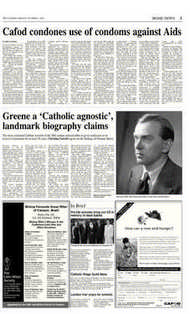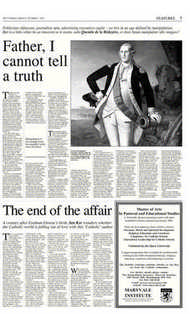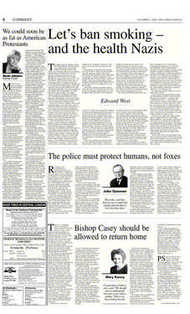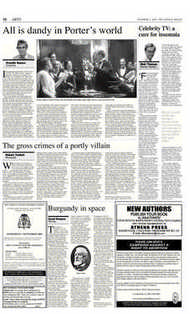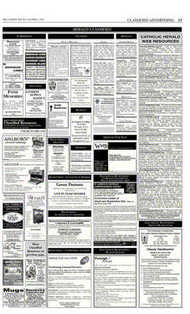Page 1, 1st October 2004
Page 1

Report an error
Noticed an error on this page?If you've noticed an error in this article please click here to report it.
Tags
Share
Related articles
Jews, Muslims And Anglicans In Protest Over Pope Cartoon
Beeb Tells Catholics That Popetown Is 'essentially
Popetown Protests Reach Germany
Mawdsley Throws Out His Tv Set In Protest At Bbc
Rumours Abound Over Fate Of Bbc Cartoon That Pokes Fun At...
Scottish Bishop Attacks Popetown Scottish Church Is...
BBC cancels Popetown – but plans to sell it abroad
Last week the corporation pulled the anti-Catholic cartoon from BBC Three to placate offended Catholics. This week it will try to market the series at a festival in Cannes
BY CHRISTINA FARRELL
THERE WAS growing anger among Catholics this week that the BBC is likely to profit from a scurrilous cartoon about life in the Vatican, despite promising not to broadcast the programme on British television.
Last week Church leaders and campaigners welcomed news from the BBC that it would not be transmitting Popetown – a 10-part fictional animation set in Rome – because of concerns that it could cause offence.
The series, which depicts an infantile pope, scheming cardinals and a power-crazed nun, was to have been shown on BBC Three, the corporation’s troubled digital channel.
Cardinal Cormac MurphyO’Connor welcomed the news that the programme had been withdrawn and said he was happy that the BBC had heeded the concerns of Catholics.
Archbishop Mario Conti of Glasgow said he was “relieved and heartened that the corporation had recognised the folly of airing such a hurtful and offensive programme”.
But it has now emerged that far from shelving Popetown, the BBC intends to profit from it in the global television market. The way is open for BBC Worldwide – the corporation’s international marketing division – to sell the programme across the world.
Popetown, renamed Holy Smoke, is one of a number of titles that will be marketed by BBC Worldwide at the international MIPCOM television festival in Cannes, France, this week.
MIPCOM is the largest and most prestigious television festival in the world with over 22,000 buyers and sellers competing in a multi-million pound market.
The BBC has defended its decision to market Holy Smoke, insisting that it will help to recoup the estimated £2 million of public money already spent in production costs. But Catholics are furious that the corporation will benefit financially from a programme which it has admitted may cause offence.
In a press release issued last week Stuart Murphy, controller of BBC Three, said he had taken the “difficult decision” not to transmit Popetown on editorial grounds.
Mr Murphy said there was a fine line in comedy between the scurrilously funny and the offensive and it had become clear that the line had been crossed.
“The comic impact of the delivered series does not outweigh the potential offence it will cause,” he said.
Kathy Gobal, of the Centre for Peace in Ilford, who helped to launch a national petition against the series, said she was dismayed by the corporation’s actions.
“I am limited by language to express my absolute disgust at its two-faced attitude and utter under handedness,” she said. “This is the BBC, formerly the most wellrespected broadcaster in the world. These people are guttersnipes. They promote everything that is evil.” The anti-Popetown petition has gathered over 35,000 signatures to date. Mrs Gobal said the campaign would now continue, but she regretted that the Church in Britain had not taken an earlier and more decisive lead against the programme.
“I don’t see any reason why the petition should not go world wide,” she said. “The bigger they want to make this, the bigger the fight they will have on their hands.” She continued: “The Catholic Church is the Body of Christ. Catholics worldwide have reason to complain about a British programme that is offensive to the Church and we will fight them right across the globe, but we should have been led by the Church on this, not by the likes of me, an old grandmother who lives in the backwoods in Kent.” Peter Jennings, spokesman for Archbishop Vincent Nichols of Birmingham, said the archbishop had urged Mark Thompson – the new Director General of the BBC and a practising Catholic – to shelve Popetown at a meeting two weeks ago. He said the Church would continue to press for the programme to be withdrawn from the international market.
“By their own account they [the BBC] are marketing a substandard product which is offensive to Catholics,” he said. “There has been an ongoing dialogue with people at the very top of the BBC and that will continue.” Mr Jennings declined to comment on any moves by the BBC to release Holy Smoke on DVD and video in Britain. “As far as I’m aware they haven’t confirmed that yet,” he said.
“We are making a plea for them to drop this. They know the views of the Catholic Church – that is why we have asked them to reconsider. This is a gradual process. You’re not going to win everything on day one.” James Mawdsley, the Catholic human rights campaigner, said he was dismayed that despite repeated pleas from Catholics Popetown had not been with drawn. He has repeated his call for Catholics to withhold their licence fees if the BBC continues to promote Holy Smoke.
He said: “I stopped paying my licence fee a year ago because, while I fail a thousand times, I no longer want to fail by deliberately denying Christ.” He said the BBC was well aware of the upset that it was causing.
“This is not about humour,” he said. “No joke is worth causing that much distress.” The BBC stands accused of wasting licence-payers’ money on Popetown. With its finances under close scrutiny from the Government it is keen to recoup its expenditure through potentially lucrative video sales and broadcast deals with other non-BBC channels.
A spokeswoman for BBC Worldwide told The Catholic Herald that it was representing Channel X, the independent production company that made the series, in all overseas sales.
The title, producer, format and a brief synopsis of the series will be listed in the BBC Worldwide catalogue. The spokeswoman denied that the programme title had been deliberately changed in an attempt to avoid the controversy associated with Popetown.
“I believe it was an internal decision that it would sell better under the new title,” she said.
blog comments powered by Disqus




